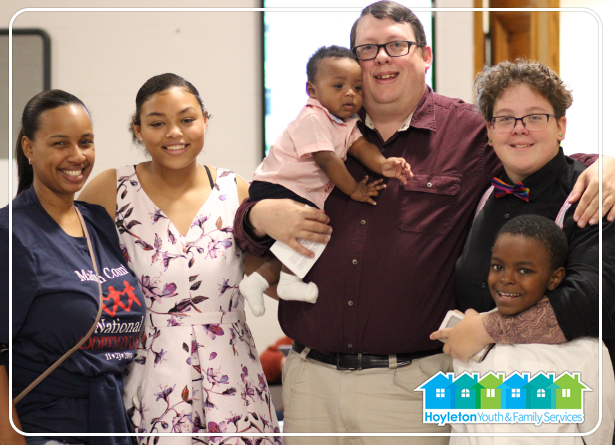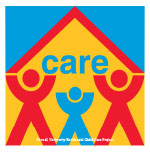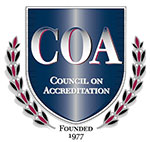PROGRAMS
GET INVOLVED
SUPPORT OUR MISSION

As May draws to a close, we want to thank the individuals who open their hearts and homes to our communities’ youth. Choosing to foster a child is an important decision, and taking the next step can seem overwhelming. However, foster parents are a welcomed shelter from the storm and provide a safe place for a child who needs stability and love, while family issues are being resolved.
In honor of National Foster Care Month, I had a chance to speak with Mr. Daniel Waters about the importance of foster care and its impact on the lives of children and their biological families.
How many years have you been a foster parent, and how many children have you fostered/adopted?
I have been a foster parent for four years. Throughout that time, I have fostered four children. My first foster care placement led to the subsequent adoption of my daughter, age 14. I have fostered my daughter’s brother and two other children from different families.
What experience or who encouraged you to become a foster parent?
There was not a time I can remember that I didn’t want to foster. Being a dad is one of the best things I have ever done or experienced, and that was my motivation to be a foster parent. I was not scared of parenting and fostering children. I was already a single dad with two kids. My daughter was 11 or 12 at the time, and my son was 14 years old. The nervousness came in regards to adding another child to the family and changing the family dynamics. Fostering became a reality when I was in a financial position and had the room to take that next step. Once we purchased the home we currently live in, we had space and it felt was the right time.
Did you realize how much fostering a child would change the family dynamics, especially when dealing with a child that has experienced trauma?
Honestly, it was rough at first. My adoptive daughter experienced trauma and had a difficult time processing the hurt and anger. However, the longer she was with us, the longer the periods between outbursts until those moments became distant memories.
I would say adjusting was hardest for my son. He was a teenager at the time and looking to assert his independence. My biological daughter and adoptive daughter are one year apart. They interact with one another as you would expect any siblings to act, best friends one minute, and disagree the next. The girls have been with each other for four years now, so they are familiar with each other personalities and now when to walk away and let it go.
You have a busy home. How do you juggle it all without family support?
I have close friends who lend a hand when needed. It also helps that my work is flexible. I can make and meet the necessary appointments for my children without any problems. Also, I have teenagers in the home, and everyone is willing to pitch in and help out. Hoyleton has also provided resources like the Counseling Care department when needed.
What is the reality of fostering?
First, there has to be a willingness to take in someone, love them unconditionally, and then say good-bye when the time comes, which is difficult. Next comes the training. And this is where I don’t feel people take fostering seriously. The negative realities of fostering shown in the training videos regarding the trauma these youth endure, coupled with the end goal of reunification, is glossed over by some potential foster parents. Fostering is not about building your family, but supporting a family when they are in need. I think some individuals miss that point. Fostering is not a Hollywood movie. When a family does take in a child with trauma, and things become hard reality hits.
How do you handle loving a child through the trauma they have suffered and protecting yourself, especially when it is time for a child to be reunified with their family?
My defense against that feeling is to work closely with my foster children’s families. I have been lucky that the biological families I work with have been open to having this type of relationship. I have not dealt with fostering a child and then not seeing them again once they are reunified with their family. In fact, my former foster son has been living with us since the shelter-in-place order. My now adoptive daughter regularly communicates with her mother and even visits with her biological siblings. As for the baby of our family, I am in contact with his uncle and send pictures.
For me, I don’t want to take any part of my foster children’s identity or leave them without the ability to reach back when they are older and connect with their biological families. I try to remember that whatever brought my foster children in care now, might not be the same when they are older. A person can never have enough people in their life who care about you. I try my best to make sure both the parent and child know I am available when the child does go back home. I am here if the family needs help.
What is one of your favorite memories regarding your foster children?
My favorite memory is when my daughter first arrived. She was around ten years old at the time and, for some reason, could not remember my name, which is Dan. So for one and a half weeks, she called me Mr. Nice Guy. For the older ones, I let them know they can call me Dan or you can call me whatever makes you comfortable. My daughter quickly started calling me, dad. My foster son calls me Dan. Good memories either way.
What practical advice would you give individuals who want to become foster parents?
It is going to be hard but stick with it. Once a child is in your home, you have to see them as family, and I don’t give up on family. However rough it becomes, let the child know you are in their corner. They need to hear and know that from you.
I want to thank Mr. Waters for sharing his foster care story. With over 400,000 children in care in the United States, the need for foster parents is more important than ever. However, interested individuals will not be making this journey alone. Committing to raise a child and partner with a family in need is how we build a brighter future for our communities’ children and grow together. Hoyleton is here to help individuals on their path to foster care with understanding eligibility requirements, training, licensing process, counseling, and other services. For more information on Foster Care and taking the next step, call the Foster Care Department at 618.688.4727.
#NationalFosterCareMonth #HoyletonCares #FosterKidsNeedAHero #FosterCare #FosterParents


